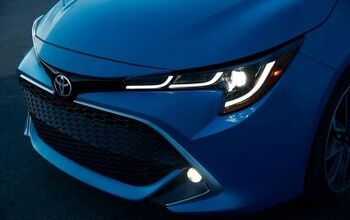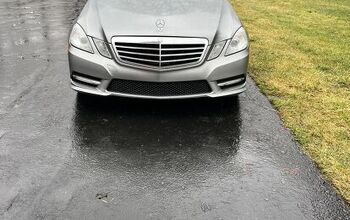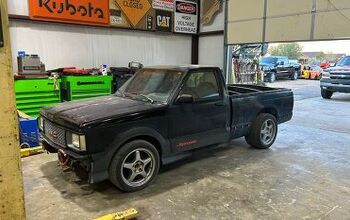Toyota Mulling a Different Kind of Small Hybrid - the Fun Kind

We’re a long way from any kind of confirmation, but Toyota’s upcoming Corolla Hatch could become something you’d want to toss around — assuming top brass listen to the brand’s chief engineer.
With the Corolla iM hatch giving way later this summer to a vastly improved five-door that ditches the Scion-era “iM” designation, the automaker has an opportunity on its hands. If Yasushi Ueda has his way, Toyota’s head engineer would turn the model into a hybrid. God, what boredom, you say — I remember borrowing that Prius C from Vrtucar. And cousin Wendy has that Prius she keeps rubbing in our face, like that makes her saviour of the world or something –
Stop! This one wouldn’t be a narcolepsy inducer. Such a vehicle would put down two types of power through all four wheels, giving Toyota a shot of that youthful image it so desperately craves.
Speaking to Australia’s Drive, Ueda said there’s a number of things Toyota could do to turn the warmer 2019 Corolla Hatch into a suitably hot hatch, but the hybrid route might not be top of mind. Still, a hot Corolla Hatch is under consideration.
“I have to consider that, I have to investigate, research,” said Ueda of the hybrid idea. “We don’t have any detailed plan yet. Of course, in the future, the idea of a hot hybrid sounds very good.”
In such a setup, the front-engined, front-drive car would don an electric motor (or a pair of them) to drive the rear wheels, with horsepower and torque being anyone’s guess. Currently, the 2019 Corolla Hatch offers one engine: a 2.0-liter inline-four making 168 horsepower and 151 lb-ft of torque. That’s a big improvement from its gutless predecessor, but hardly a worthy foil for other hatches boasting a standalone letter after their name.
Toyota’s hot hatch would need an output in excess of 250 hp to do battle with the likes of Honda, Volkswagen, and now Hyundai. However, all-wheel drive and improved fuel economy from an electric rear end would not only endow the Corolla Hatch with newfound handling and getaway powers, it would also make it unique in the segment.
Of course, it could also scare some customers off.
[Image: Steph Willems/TTAC]

More by Steph Willems
Latest Car Reviews
Read moreLatest Product Reviews
Read moreRecent Comments
- W Conrad I'm not afraid of them, but they aren't needed for everyone or everywhere. Long haul and highway driving sure, but in the city, nope.
- Jalop1991 In a manner similar to PHEV being the correct answer, I declare RPVs to be the correct answer here.We're doing it with certain aircraft; why not with cars on the ground, using hardware and tools like Telsa's "FSD" or GM's "SuperCruise" as the base?Take the local Uber driver out of the car, and put him in a professional centralized environment from where he drives me around. The system and the individual car can have awareness as well as gates, but he's responsible for the driving.Put the tech into my car, and let me buy it as needed. I need someone else to drive me home; hit the button and voila, I've hired a driver for the moment. I don't want to drive 11 hours to my vacation spot; hire the remote pilot for that. When I get there, I have my car and he's still at his normal location, piloting cars for other people.The system would allow for driver rest period, like what's required for truckers, so I might end up with multiple people driving me to the coast. I don't care. And they don't have to be physically with me, therefore they can be way cheaper.Charge taxi-type per-mile rates. For long drives, offer per-trip rates. Offer subscriptions, including miles/hours. Whatever.(And for grins, dress the remote pilots all as Johnnie.)Start this out with big rigs. Take the trucker away from the long haul driving, and let him be there for emergencies and the short haul parts of the trip.And in a manner similar to PHEVs being discredited, I fully expect to be razzed for this brilliant idea (not unlike how Alan Kay wasn't recognized until many many years later for his Dynabook vision).
- B-BodyBuick84 Not afraid of AV's as I highly doubt they will ever be %100 viable for our roads. Stop-and-go downtown city or rush hour highway traffic? I can see that, but otherwise there's simply too many variables. Bad weather conditions, faded road lines or markings, reflective surfaces with glare, etc. There's also the issue of cultural norms. About a decade ago there was actually an online test called 'The Morality Machine' one could do online where you were in control of an AV and choose what action to take when a crash was inevitable. I think something like 2.5 million people across the world participated? For example, do you hit and most likely kill the elderly couple strolling across the crosswalk or crash the vehicle into a cement barrier and almost certainly cause the death of the vehicle occupants? What if it's a parent and child? In N. America 98% of people choose to hit the elderly couple and save themselves while in Asia, the exact opposite happened where 98% choose to hit the parent and child. Why? Cultural differences. Asia puts a lot of emphasis on respecting their elderly while N. America has a culture of 'save/ protect the children'. Are these AV's going to respect that culture? Is a VW Jetta or Buick Envision AV going to have different programming depending on whether it's sold in Canada or Taiwan? how's that going to effect legislation and legal battles when a crash inevitibly does happen? These are the true barriers to mass AV adoption, and in the 10 years since that test came out, there has been zero answers or progress on this matter. So no, I'm not afraid of AV's simply because with the exception of a few specific situations, most avenues are going to prove to be a dead-end for automakers.
- Mike Bradley Autonomous cars were developed in Silicon Valley. For new products there, the standard business plan is to put a barely-functioning product on the market right away and wait for the early-adopter customers to find the flaws. That's exactly what's happened. Detroit's plan is pretty much the opposite, but Detroit isn't developing this product. That's why dealers, for instance, haven't been trained in the cars.
- Dartman https://apnews.com/article/artificial-intelligence-fighter-jets-air-force-6a1100c96a73ca9b7f41cbd6a2753fdaAutonomous/Ai is here now. The question is implementation and acceptance.


































Comments
Join the conversation
Totally. Just call it the Lexus CT.
"And cousin Wendy has that Prius she keeps rubbing in our face, like that makes her saviour of the world or something" I've never had a Prius owner say anything smug to me, but I can't count how many people have said smug things about Prius owners. Get over it.